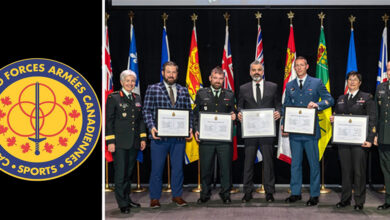Health and Wellness
Help is out there is the message for Mental Illness Awareness Week
The stigma attached to mental illness usually confines the sufferers in the dark, too afraid to reach out for help. But during the Mental Illness Awareness Week (MIAW), five individuals will step out of the shadows to share their stories and struggles with mental illness to inspire others to reach out as part of the Faces of Mental Illness Campaign.
MIAW, initiated thirteen years ago by the Canadian Alliance on Mental Illness and Mental Health (CAMIMH), runs from Oct. 5 to the 10 to create national awareness, reduce stigma and educate Canadians of the many faces of mental illness.
“It’s important that we go beyond the dialogue and start to take action. And that means looking at services that are needed by individuals,” said Florence Budden CAMIMH Campaign Chair 2015.
During the week, CAMIMH takes the dialogue one step further to translate it to action on a grassroots and federal level. On Tuesday, Budden along with the five individuals part of the Faces campaign will meet parliamentarians to educate them on the issues of mental health and what they can do to push the agenda forward for mental health.
Budden also plans on advocating for the federal government to incorporate measures for psychological workplace safety within the government and become nationwide leaders.
“It is very important with the election coming up that its part of the national agenda,” said Budden.
The campaign will also reach out to local initiatives in order to create a larger voice, work alongside the Mental Health Commission of Canada, and distribute more than 160,000 pieces of promotional material to inform Canadians about the campaign.
However, the largest component of the campaign is the Faces of Mental Illness.
“It’s beneficial in the sense that individuals are getting the opportunity to hear other people’s stories about their personal recovery and lived experiences with mental illness so it breaks that silence and lets people know yes you can talk about what’s happening,” said Budden.
This year’s five Faces of Mental Illness are all individuals who have overcome the journey to recovery after being diagnosed with various mental illnesses. These individuals include Kendra Fisher, a former hockey player and now mental health advocate; Wali Shah a 20 year-old student and youth mentor, Patricia Lemoine a communications and marketing manager; Julie Tansey a member of the Longeuil mental health committee and Peter Neily a member of the RCMP Cornwall Regional Task Force.
“When I was told of my nomination by the RCMP I was really humbled and honoured to be nominated. I didn’t know anything about the campaign but once I started to look at what it’s about it drew my interest. I learned about the services in the community and about CAMIMH. It was a real great experience to see there are great Canadians improving lives of people around them. It’s been an eye-opener since day one,” explained Neily.
Neily started working for the RCMP in 2004 and was posted out to Surrey, BC as a patrol officer. On a fateful night in March 2011 during a night watch, Neily was forced into an armed conflict that ended fatally.
The impact of the incident resulted in Neily suffering from PTSD and led him down a road of isolation from family and friends, turning to alcohol to numb the pain.
“It deeply affected me in ways that at first I didn’t really understand because for the first few months I really worked very hard to get back to work, and that was my only focus. I didn’t really deal with some of the psychological effects and repressed them. But when they finally did come to the surface, they surfaced in a life altering way,” said Neily.
It was through the help of the very friends, family and colleagues Neily isolated that he was able to begin down the road to recovery.
“I came forward to my organization after I hit rock bottom and realized I needed help. I did that through the strength of my friends and family and also some colleagues that were instrumental in letting me know I needed help, and that help was available,” said Neily.
Now Neily is an operational police officer in Cornwall.
It was through the help of a senior officer who had suffered from a mental illness himself to get Neily on the track to recovery and now he is hoping that by coming forward with his story he can inspire someone else to seek help.
“I’ve come out to share my experiences because I feel we really need to open the door on some of these dialogues and let people know there is help out there instead of doing what I did and thinking no one cared anymore,” explained Neily.
CAMIMH is a non-profit organization comprised of 16 national health care organizations. Established in 1998, CAMIMH works to educate the community and influence government policies. The organization is behind both the MIAW and Champions of Mental Health campaign.
For more information on the campaign visit CAMIMH website at http://www.camimh.ca/, find them on Twitter @MIAWCanada or by their Facebook Page, Face It: Mental Illness Awareness.
The stigma attached to mental illness usually confines the sufferers in the dark, too afraid to reach out for help. But during the Mental Illness Awareness Week (MIAW), five individuals will step out of the shadows to share their stories and struggles with mental illness to inspire others to reach out as part of the Faces of Mental Illness Campaign.
MIAW, initiated thirteen years ago by the Canadian Alliance on Mental Illness and Mental Health (CAMIMH), runs from Oct. 5 to the 10 to create national awareness, reduce stigma and educate Canadians of the many faces of mental illness.
“It’s important that we go beyond the dialogue and start to take action. And that means looking at services that are needed by individuals,” said Florence Budden CAMIMH Campaign Chair 2015.
During the week, CAMIMH takes the dialogue one step further to translate it to action on a grassroots and federal level. On Tuesday, Budden along with the five individuals part of the Faces campaign will meet parliamentarians to educate them on the issues of mental health and what they can do to push the agenda forward for mental health.
Budden also plans on advocating for the federal government to incorporate measures for psychological workplace safety within the government and become nationwide leaders.
“It is very important with the election coming up that its part of the national agenda,” said Budden.
The campaign will also reach out to local initiatives in order to create a larger voice, work alongside the Mental Health Commission of Canada, and distribute more than 160,000 pieces of promotional material to inform Canadians about the campaign.
However, the largest component of the campaign is the Faces of Mental Illness.
“It’s beneficial in the sense that individuals are getting the opportunity to hear other people’s stories about their personal recovery and lived experiences with mental illness so it breaks that silence and lets people know yes you can talk about what’s happening,” said Budden.
This year’s five Faces of Mental Illness are all individuals who have overcome the journey to recovery after being diagnosed with various mental illnesses. These individuals include Kendra Fisher, a former hockey player and now mental health advocate; Wali Shah a 20 year-old student and youth mentor, Patricia Lemoine a communications and marketing manager; Julie Tansey a member of the Longeuil mental health committee and Peter Neily a member of the RCMP Cornwall Regional Task Force.
“When I was told of my nomination by the RCMP I was really humbled and honoured to be nominated. I didn’t know anything about the campaign but once I started to look at what it’s about it drew my interest. I learned about the services in the community and about CAMIMH. It was a real great experience to see there are great Canadians improving lives of people around them. It’s been an eye-opener since day one,” explained Neily.
Neily started working for the RCMP in 2004 and was posted out to Surrey, BC as a patrol officer. On a fateful night in March 2011 during a night watch, Neily was forced into an armed conflict that ended fatally.
The impact of the incident resulted in Neily suffering from PTSD and led him down a road of isolation from family and friends, turning to alcohol to numb the pain.
“It deeply affected me in ways that at first I didn’t really understand because for the first few months I really worked very hard to get back to work, and that was my only focus. I didn’t really deal with some of the psychological effects and repressed them. But when they finally did come to the surface, they surfaced in a life altering way,” said Neily.
It was through the help of the very friends, family and colleagues Neily isolated that he was able to begin down the road to recovery.
“I came forward to my organization after I hit rock bottom and realized I needed help. I did that through the strength of my friends and family and also some colleagues that were instrumental in letting me know I needed help, and that help was available,” said Neily.
Now Neily is an operational police officer in Cornwall.
It was through the help of a senior officer who had suffered from a mental illness himself to get Neily on the track to recovery and now he is hoping that by coming forward with his story he can inspire someone else to seek help.
“I’ve come out to share my experiences because I feel we really need to open the door on some of these dialogues and let people know there is help out there instead of doing what I did and thinking no one cared anymore,” explained Neily.
CAMIMH is a non-profit organization comprised of 16 national health care organizations. Established in 1998, CAMIMH works to educate the community and influence government policies. The organization is behind both the MIAW and Champions of Mental Health campaign.
For more information on the campaign visit CAMIMH website at http://www.camimh.ca/, find them on Twitter @MIAWCanada or by their Facebook Page, Face It: Mental Illness Awareness.










